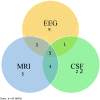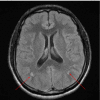Evidence of neuroinflammation and immunotherapy responsiveness in individuals with down syndrome regression disorder
- PMID: 35659536
- PMCID: PMC9164321
- DOI: 10.1186/s11689-022-09446-w
Evidence of neuroinflammation and immunotherapy responsiveness in individuals with down syndrome regression disorder
Abstract
Background: Down syndrome regression disorder is a symptom cluster consisting of neuropsychiatric regression without cause. This study evaluated the incidence of neurodiagnostic abnormalities in individuals with Down syndrome regression disorder and determined if abnormalities are indicative of responses to therapeutic intervention.
Methods: A retrospective, multi-center, case-control study was performed. Patients were required to have subacute onset and the presence of four of five symptom groups present (cognitive decline, expressive language, sleep derangement, loss of ability to perform activities of daily living, and/or a new movement disorder) and no other explanation for symptoms.
Results: Individuals with Down syndrome regression disorder were comparable to a cohort of individuals with only Down syndrome although had higher rates of autoimmune disease (p = 0.02, 95%CI 1.04-1.75). Neurodiagnostic abnormalities were found on EEG (n = 19, 26%), neuroimaging (n = 16, 22%), and CSF (n = 9, 17%). Pleocytosis was appreciated in five cases, elevated total protein in nine, elevated IgG index in seven, and oligoclonal bands in two. Testing within 2 years of symptom onset was more likely to have neurodiagnostic abnormalities (p = 0.01, 95%CI 1.64-37.06). In individuals with neurodiagnostic abnormalities, immunotherapy was nearly four times more likely to have a therapeutic effect than in those without neurodiagnostic abnormalities (OR 4.11, 95%CI 1.88-9.02). In those with normal neurodiagnostic studies (n = 43), IVIg was effective in 14 of 17 (82%) patients as well although other immunotherapies were uniformly ineffective.
Conclusions: This study reports the novel presence of neurodiagnostic testing abnormalities in individuals with Down syndrome regression disorder, providing credence to this symptom cluster potentially being of neurologic and/or neuroimmunologic etiology.
Keywords: Cerebrospinal fluid; Down syndrome; Encephalopathy; Immunotherapy; Regression.
© 2022. The Author(s).
Conflict of interest statement
The authors declare that they have no competing interests.
Figures




References
MeSH terms
Grants and funding
LinkOut - more resources
Full Text Sources
Medical

